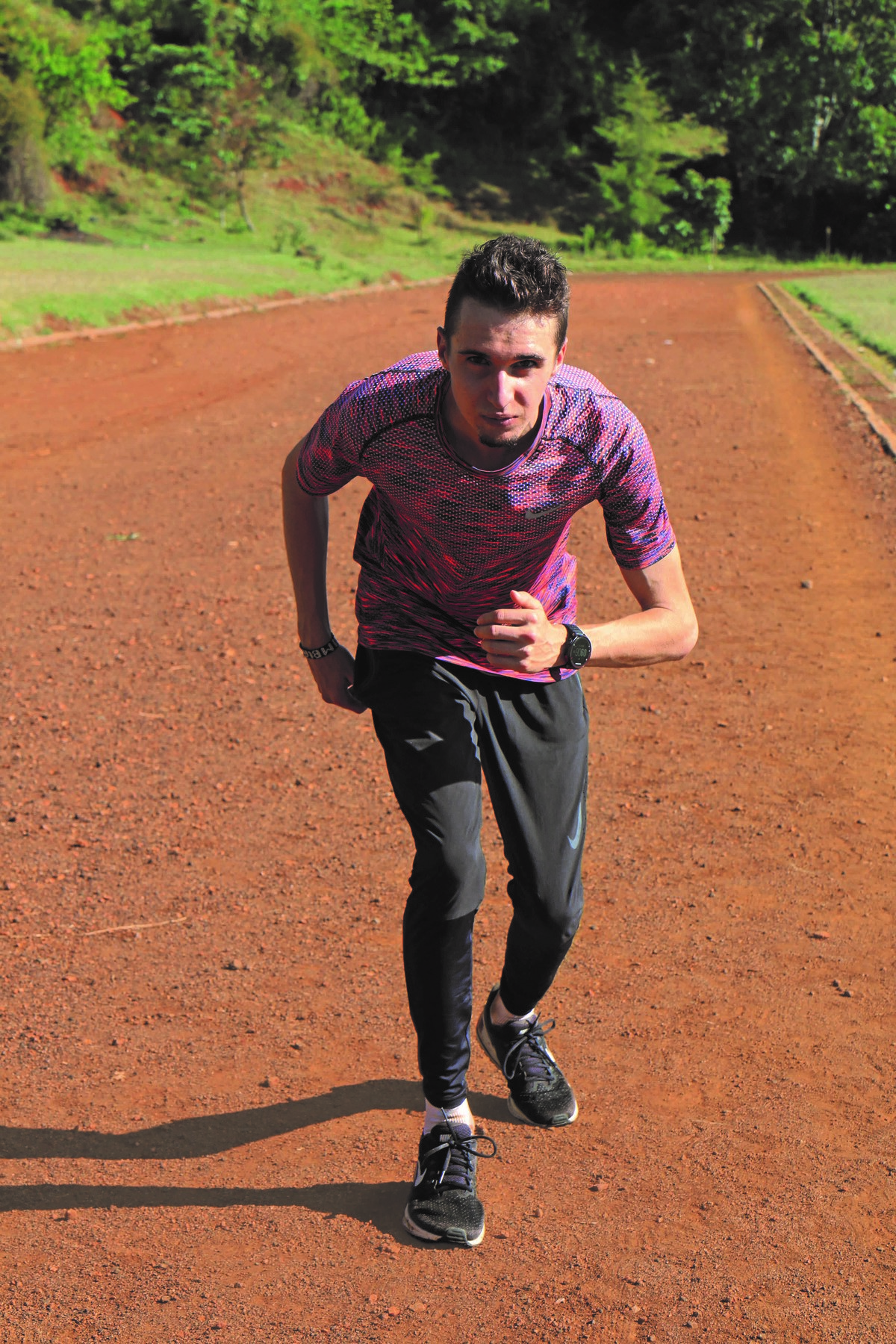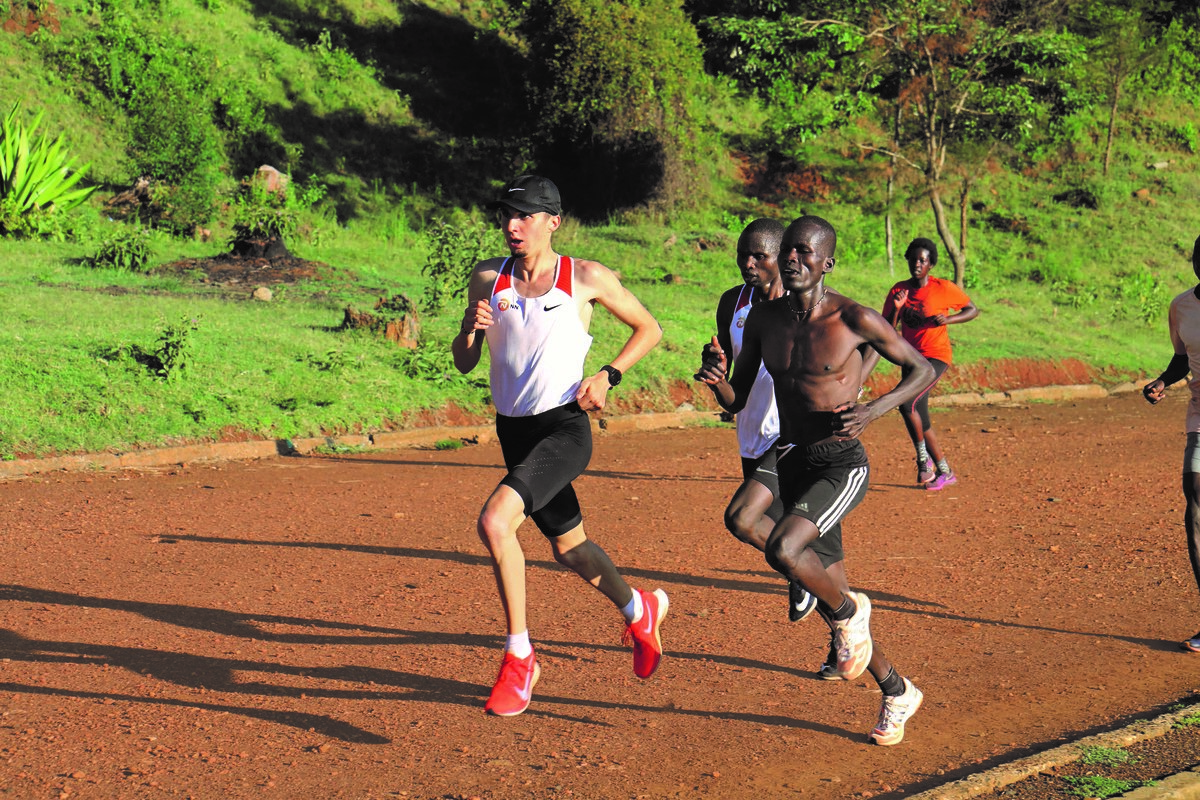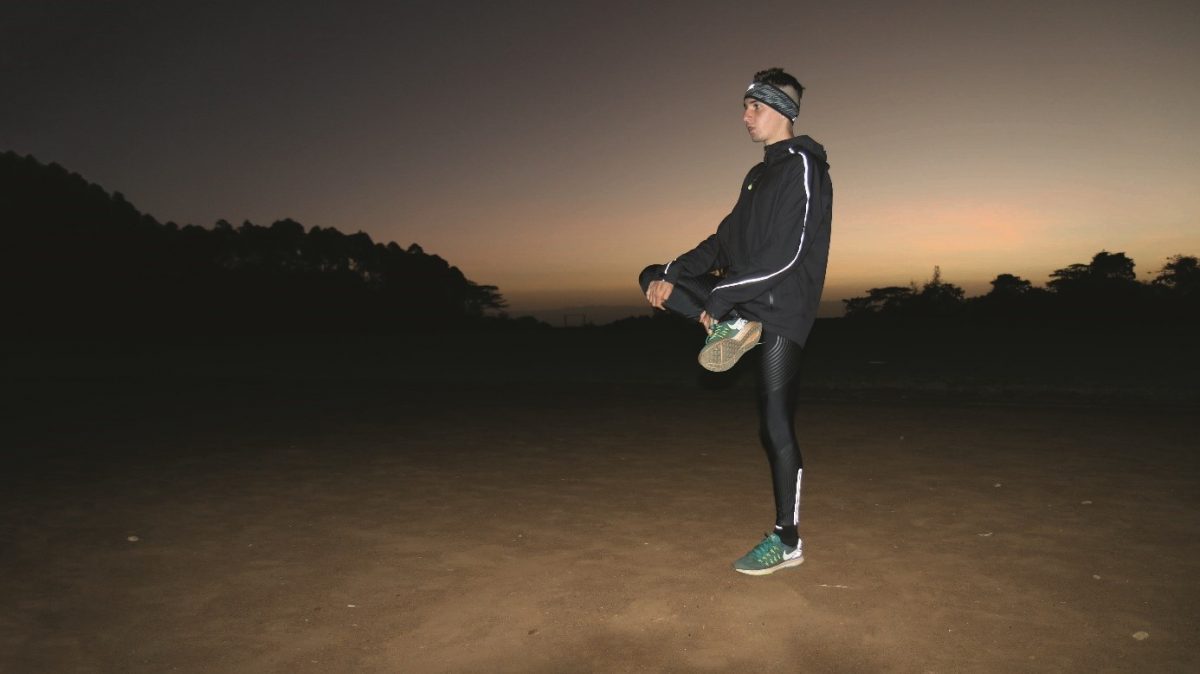Text and photos: Jürg Wirz – this blog entry is provided by the Swiss magazine FIT for LIFE. If you’re interested in reading informative articles about running and endurance sports on a regular basis (in German), click here.

The 22-year-old Julien Wanders from Geneva runs from record to record and is currently on cloud number nine. On 8 February, the next big challenge awaits the young man at the half marathon in Ras Al Khaimah. He lives for sporting success like no other Swiss has done before him. FIT for LIFE took a closer look at Julien Wanders’ training routine.
UPDATE: Wanders completed the half marathon in Ras Al Khaimah in a time of 59.13 and replaces Mo Farah as European record holder over this distance.
His story reads like a modern fairy tale: Once upon a time there was a little boy who was not even six years old when his parents let him take part in the Course de l’Escalade. In the category “Poussin B” he only made rank 152, but he was so fascinated by the atmosphere and the surroundings that he wanted to join an athletics club. The people in charge at Stade Genève saw how motivated he was and let him join in, even though he was technically still too young. However, it took a while before he could really live his passion of running. For several years, Julien was trained in all athletics disciplines, even as a 14-year-old he hit the ball, threw the spear and jumped far and high. Here – and also thanks to a lot of sports sessions with his family – he was able to lay the groundwork for his career as a runner.
After graduating from high school, which he completed with flying colors, although, as he says, he never actually invested much time into school, there was only one professional goal for him: to become a world-class runner. To achieve this, he moved to Kenya. The first time, at the end of 2014, he had a flight to Nairobi, he knew how to get to Iten and he had the phone number of a Kenyan runner given to him by a colleague in Geneva. Everything else was unclear. His parents were – quite understandably – a little worried, but they knew he wanted it badly and they couldn’t stop him even though he was only 18. Everything went well. In the meantime, they have visited him several times in Kenya, the father recently came over for Christmas, and they are proud of what their son has achieved by his own efforts.
«THE BEST DECISION I EVER MADE»
Kenya has long since become Julien Wanders’ home. He lives with his Kenyan girlfriend Kolly in a little two-room house, has his own training group and feels absolutely at home here in Iten, this small town at 2400 meters above sea level. “I would never have done the same thing in Switzerland,” he says, without even a second’s hesitation. “It was my best decision. Here, I have everything I need as a runner. When I’m in Switzerland for a few weeks, I’m afraid of losing my form, focus and motivation. It’s stressful. In Iten, I can do a run starting right at my doorstep, I can get the most essential food just around the corner and the guy who usually massages me three times a week comes to my house.”
Early on he managed to replace the running legend Markus Ryffel as Swiss record holder over 5000 meters of the U18 and U20, but what Julien Wanders achieved in the last twelve months exceeds the boldest expectations: his 60:09 minutes in the half marathon of 11 February 2018 is a European U23 record, the 27:32 of 14 October in Durban and the 27:25 of 30 December in Houilles European record, seventh place in the world ranking 2018 behind five Kenyans and one Ugandan.
The previous record holder in the 10-kilometer road race was none other than four-time Olympic champion and six-time World champion Mo Farah. On February 8, Wanders wants to bring another Farah European record to Switzerland in Ras Al Khaimah; his focus is on 59:32 in the half marathon. The course in the north of the United Arab Emirates is considered to be very fast. Over the years, there have been 16 times pf people running under 59:30 minutes. Last year, Kenyan Bedan Karoki won with a record time of 58:42.
THE COUNTDOWN UNTIL FEBRUARY 8TH

The five and a half training weeks between Houilles and Ras Al Khaimah (8 February) are well-structured. The first week was mainly for recreation. Julien Wanders went running in the hilly terrain according to his desire. Coach Marco Jäger, who has been looking after him first in Geneva and now from afar since 2011, says: “In Houilles, Julien had to fight hard on the last kilometers; the race really took it out of him. It was therefore important not to push too hard too early.”
At the end of the recovery week, a long run (30 km) was planned, on the following Tuesday, a track training with short exercise peaks. And then it was back to half marathon training with weekly distances of around 200 kilometers. During three weeks, each week was harder than the other before.
The last hard week is two weeks before the half marathon. And the last days before the race are quite easy, although even then, the extent and intensity are not completely reduced. And for the very last two days, in this case Wednesday and Thursday, the Swiss has his routine: first, running for 50 minutes in the morning and 30 in the afternoon, on the day before the race 40 to 50 minutes in the morning. The pace? “It can be 4:20 per kilometer, but also 3:40 or 3:30. It’s important that it feels good.”
The race day looks the same: “Three to four hours before the start, I go running for 20 to 30 minutes, a kind of warm-up.” Then, I go back to the hotel and have breakfast. Before the race, it’s very simple: bread, maybe with some butter and honey or jam, sometimes, if it’s not too close to the start, some eggs, that is, some protein, tea, but no milk. “Nothing special, just a normal breakfast,” says Julien Wanders and adds: “As many carbohydrates and as little fat as possible is important. Immediately before the race I warm myself up again by running and take a few sips from my Winforce carbohydrate drink”.
He can’t sleep very well before the race, especially when the start is very early. In Durban, the start already took place at 07 o’clock in the morning, Julien only slept from 23 o’clock to 02.30 o’clock – and still set a European record. The start of the half marathon in the United Arab Emirates also takes place in the morning – at 08 o’clock.
A LIFE FOR THE SUCCESS
Julien Wanders lives for his sport like no Swiss has ever done before him. He is fortunate enough to recover very quickly from the hard training sessions and to be able to complete a programme that only the world’s best marathon runners can achieve. FIT for LIFE looked over the shoulders of the shooting star of Swiss running in training and experienced that a “normal” week in the young Swiss’s life is not for wimps, as Julien Wanders’ protocol (below) shows.
In total, between 180 and 185 kilometers came together in Houilles in this penultimate week before the 10-km European record. The Swiss shooting star does not treat himself to a day without training. As a rule, he only takes Saturday afternoon off. He usually goes with his girlfriend Kolly to a restaurant in Eldoret, just 40 kilometers away, preferably to an Indian supermarket, perhaps the new supermarket, which has imported Swiss cheese in its range and also the dark Lindt chocolate, or he meets up with friends.
Success does not tolerate half measures. Julien Wanders explains: “I chose this path because I love running and training. And because I have big goals.” He has already achieved a few of them. Next up is the half marathon on 8 February in the streets of Ras Al Khaimah.
A typical railway training in Kenya: JULIEN WANDERS IST THE LEADER

Place: Tambach Teachers Training College
Altitude: 1950 meters above sea level
Training start: 7 a.m.
The sun rises over the nearby hills. In a short time, the temperature increases from 10 or 12 degrees to over 20 degrees Celsius. A few Japanese people do their rounds in nail shoes, Julien Wanders and his colleagues complete their program in street running shoes:
- 5 series of 5 × 400 m each in 63/64 sec and then 35 sec break, after each series 4:30 min break
- 5-min break
- 5 × 300 m in 44/45 sec with 45-sec breaks
- 5-min break
- 3 × 200 m in 28/29 sec with 45-50-sec breaks
- 5-min break
- 1 × 400 m in 56 sec
At the end, the athletes congratulate each other; it was a hard training they can be proud of. The fact that the Swiss regularly leaves the Kenyans standing in the dust doesn’t seem to bother them. They accept him as their leader.
Minutes of the penultimate week before the European record in Houilles: TRAINING, MEAL PLAN, SLEEP
Monday
Day watch was at 05.40, about 30 minutes before I met with my training group. I drank a little water, went to the toilet and then left the house. We ran for one hour at a speed of 3:45 minutes per kilometer, a total of 16 kilometers. Then 10 times 100 meters hill sprints, fast.
At 07.30, I was back in the house and made my breakfast: tea and bread with some egg, because of the protein, which took maybe 30 minutes. At 9 o’clock I was back in bed and tried to sleep another hour and a half to two hours.
From 11 to 12, I had a massage and at 12 o’clock, I started to prepare lunch. This time just with what I found in the fridge: pasta with tomato sauce. It took about 15 minutes. Afterwards, I lay down again until about 14.30. After getting up, I took a gel and meditated for half an hour. At half past four, I did some strength exercises for 20 to 30 minutes.
At 16 o’clock it was time for the next training run with the boys. This time it was only for 30 minutes, followed by stretching. At 17 o’clock, I was already at home. I ate a snack, some bread, drank tea and took a shower. Then, I watched a movie and worked on my mails and social media.
I cooked dinner with my girlfriend at 7 p.m. On the menu: Ugali, the typical Kenyan corn dish, and Managu, a traditional Kenyan vegetable with a lot of iron. I tried to eat a lot: Energy for Tuesday. And then I enjoyed some of my dark Swiss chocolate. I went to bed at 20.30 o’clock.
Tuesday
Today, I already got up at 05.20 as we had to go to Tambach Teachers College with a Matatu, a Kenyan minibus, in order to do a training on tracks (see above). So, I had 40 minutes to get ready, including the drink for the training. I usually pack my shoes and clothes the night before. I did a little stretching, maybe 10 minutes – and had some coffee to help me wake up. At 6.30 a.m. we started the warmup. The session took one hour and 20 minutes, overall with warmup and cooldown it lasted until 9am, so two and a half hours in total.
After the trainings, I drove back to Iten in the Matatu. There, I had a small breakfast and drank some tea; after a hard training I am usually not very hungry. After the track training, I was very dirty, so I didn’t wait until the evening with the shower – and then went back to bed. After a hard session, it’s more like just relaxing though. Like other times before, I couldn’t really sleep; I kept myself busy with my mobile phone.
At half past eleven, I went to my girlfriend’s restaurant for lunch: a rich menu with chicken, rice, chapati, vegetables, and some mango juice to drink. Then, back to the house and about an hour and a half of sleep. This afternoon, we didn’t do a second training, so I got to spend time with my girlfriend. Dinner was at 19.30 o’clock, at 20.00 o’clock I went to sleep.
Wednesday
Similar to Monday: One hour (16 kilometers) in the morning, 40 minutes, maybe 10 kilometers, in the afternoon, followed by strides (sprints with about 90 percent intensity), running school and climbs. Like every afternoon, when I don’t go to the gym, I do 20 to 30 minutes of strength training in the house. Usually, I go to the gym on Wednesdays and Fridays, sometimes on Sundays. However, because there was another hard workout scheduled for Thursday, I did a workout at home this time.
Thursday
Getting up already shortly before 05 o’clock. Meeting at 05.30. With the Matatu, we drove 30 minutes to Ziwa. After the warmup, we started: 5 times 2 kilometers fast, 1 km medium in between, at the end 1 km fast again. All in all, we covered 16 kilometers. Fast for me means between 3:00 and 2:55 min per kilometer, average between 3:25 and 3:15. At the end, it’s 16 kilometers at an average of about 3:05 – and all on a slightly hilly natural road. As usual, the Matatu driver followed us carrying the drinks.
In the afternoon, I did a slow run for 40 minutes at 4:00 to 4:10 per kilometer, followed by drills to improve the cadence.
Friday
Run in the morning at 06.50 with an easy pace of about 3:45 per kilometer. Some downhill sprints afterwards.
At half past five in the afternoon, 30 minutes of jogging, followed by dynamic exercises, jumps, etc.
Saturday
This is usually the day for the long run. But since there was a hard training to be completed on Sunday, this time, we only went one hour and ten minutes early in the morning at a moderate pace.
Sunday
Today, we went to Tambach again, but this time, not for the track. We got on the road at 05.40 and started our training at half past six: Six kilometers up the road, probably the hardest training. My record is 3:35 minutes per kilometer, but this time I had to stop after three kilometers. I was drained, physically empty.
On Sunday afternoon, I went for light jogging and some drills. Then, I needed a few easy training days to recover, as the following Sunday would be the 10-kilometer road race in Houilles. I really didn’t know what to expect – but luckily, it went well.

